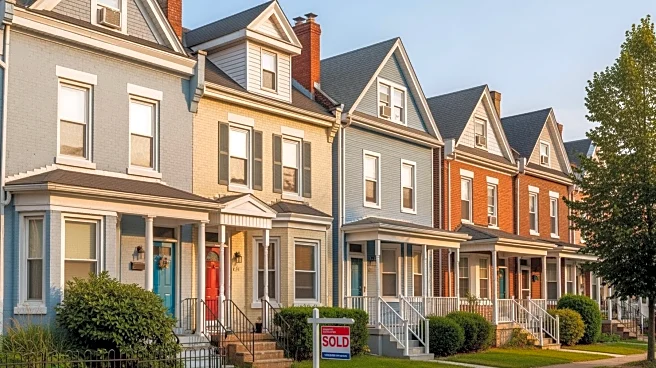What's Happening?
A recent study has revealed that investors have purchased approximately 25% of single-family homes sold in Philadelphia over the past six years. These acquisitions are concentrated in predominantly Black and Hispanic neighborhoods, raising concerns about
housing affordability and quality. The study, conducted by the Reinvestment Fund and the Center for Law, Inequality, and Metropolitan Equity at Rutgers Law School, indicates that most investors are renting out these properties rather than flipping them. This trend has reduced the supply of homes available to local buyers, driving up prices and rents. The presence of investors, who often purchase homes with cash or at lower interest rates, makes it difficult for lower-income and first-time homebuyers to compete in the market.
Why It's Important?
The influx of investors in Philadelphia's housing market has significant implications for local residents, particularly those in economically challenged neighborhoods. While investors can revitalize run-down properties and expand rental options, they also contribute to rising housing costs and potential displacement of low-income residents. The study highlights the need for balanced investment that supports community stability without exploiting tenants. The findings also suggest that larger corporate landlords are more likely to evict tenants, which can destabilize communities and increase fears of displacement. Addressing these issues is crucial for ensuring equitable access to housing and maintaining neighborhood integrity.
What's Next?
The study's authors recommend several policy changes to mitigate the negative impacts of investor purchases, including improved licensing, proactive inspections, and increased transparency in property ownership. State and local lawmakers may consider new regulations requiring disclosure of ownership identities for rental properties. Community groups are expected to advocate for these changes and work towards identifying investors in their neighborhoods. The future may involve organizing and policy solutions aimed at protecting tenants and ensuring responsible investment practices.
Beyond the Headlines
The changing landscape of Philadelphia's housing market reflects broader trends in urban real estate investment. As cities grapple with affordability and displacement issues, the role of investors becomes increasingly complex. Ethical considerations around tenant rights and community impact are central to discussions about urban development. Long-term shifts in housing policy and investment strategies could redefine the balance between revitalization and community preservation.

















